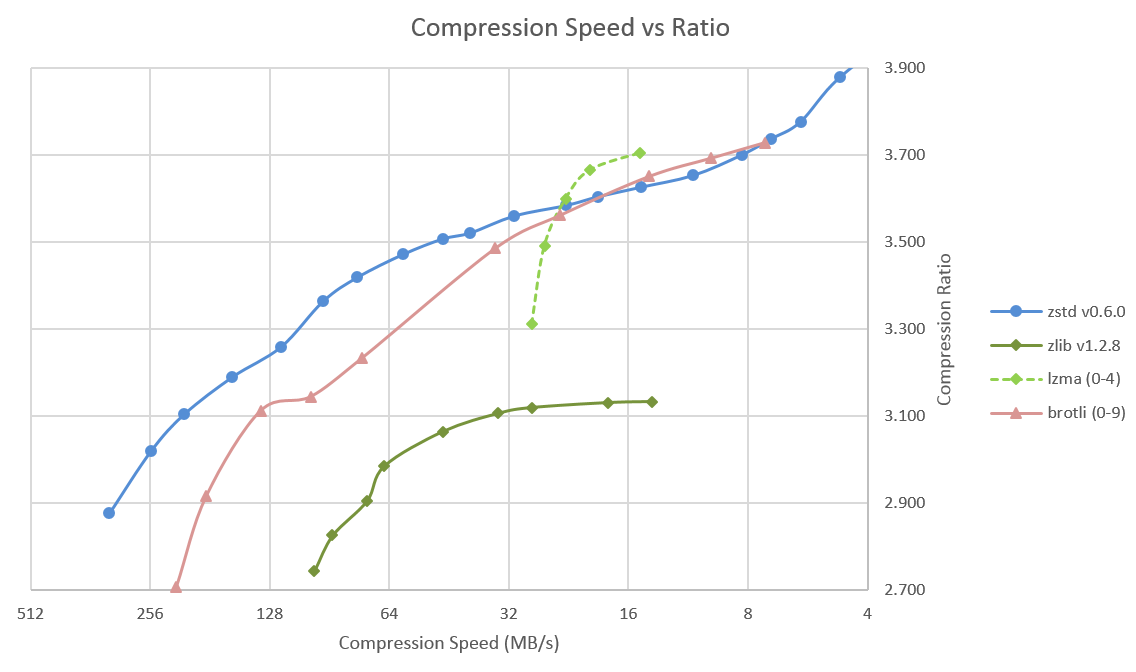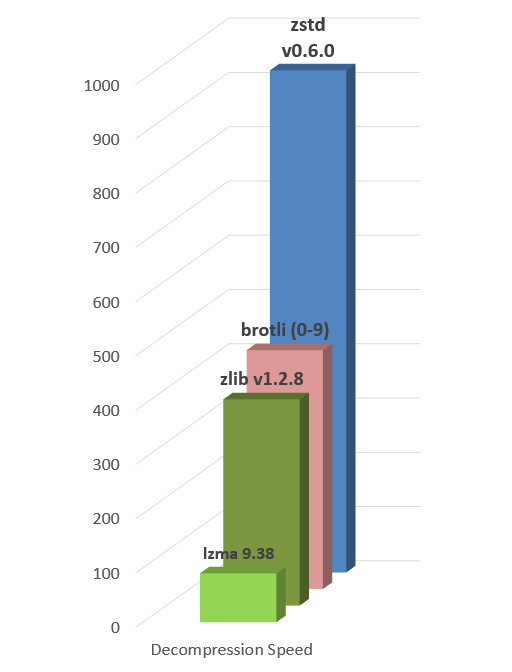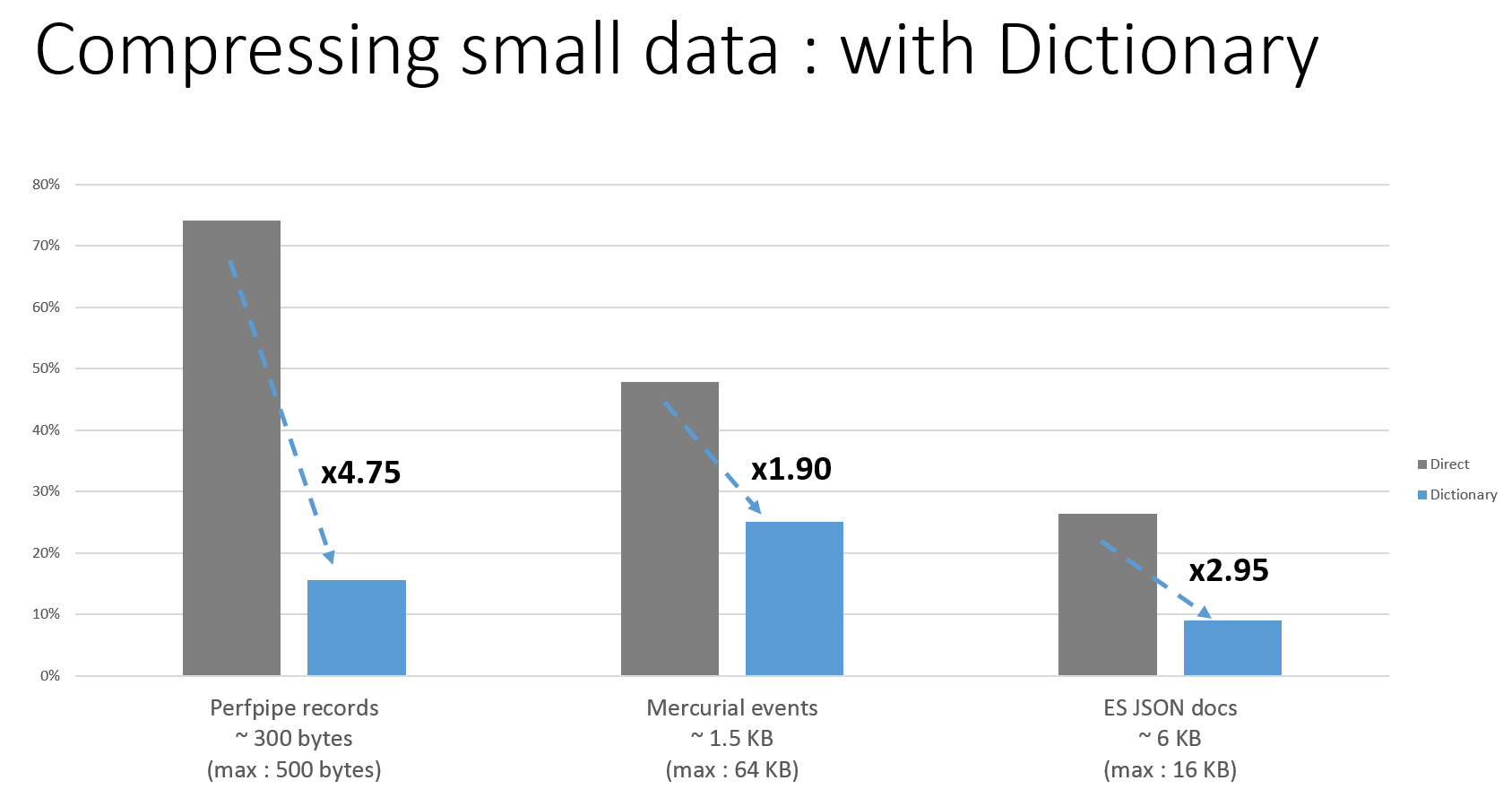| images | ||
| lib | ||
| programs | ||
| projects | ||
| versionsTest | ||
| zlibWrapper | ||
| .gitattributes | ||
| .gitignore | ||
| .travis.yml | ||
| appveyor.yml | ||
| Makefile | ||
| NEWS | ||
| README.md | ||
Zstd, short for Zstandard, is a fast lossless compression algorithm, targeting real-time compression scenarios at zlib-level compression ratio.
It is provided as a BSD-license package, hosted on Github.
| Branch | Status |
|---|---|
| master | |
| dev |
As a reference, several fast compression algorithms were tested and compared to zlib on a Core i7-3930K CPU @ 4.5GHz, using lzbench, an open-source in-memory benchmark by @inikep compiled with gcc 5.2.1, on the Silesia compression corpus.
| Name | Ratio | C.speed | D.speed |
|---|---|---|---|
| MB/s | MB/s | ||
| zstd 0.6.0 -1 | 2.877 | 330 | 915 |
| zlib 1.2.8 -1 | 2.730 | 95 | 360 |
| brotli -0 | 2.708 | 220 | 430 |
| QuickLZ 1.5 | 2.237 | 510 | 605 |
| LZO 2.09 | 2.106 | 610 | 870 |
| LZ4 r131 | 2.101 | 620 | 3100 |
| Snappy 1.1.3 | 2.091 | 480 | 1600 |
| LZF 3.6 | 2.077 | 375 | 790 |
Zstd can also offer stronger compression ratio at the cost of compression speed. Speed vs Compression trade-off is configurable by small increment. Decompression speed is preserved and remain roughly the same at all settings, a property shared by most LZ compression algorithms, such as zlib.
The following test is run on a Core i7-3930K CPU @ 4.5GHz, using lzbench, an open-source in-memory benchmark by @inikep compiled with gcc 5.2.1, on the Silesia compression corpus.
| Compression Speed vs Ratio | Decompression Speed |
|---|---|
 |
 |
Several algorithms can produce higher compression ratio at slower speed, falling outside of the graph. For a larger picture including very slow modes, click on this link .
The case for Small Data compression
Previous charts provide results applicable to typical files and streams scenarios (several MB). Small data come with different perspectives. The smaller the amount of data to compress, the more difficult it is to achieve any significant compression.
This problem is common to any compression algorithm. The reason is, compression algorithms learn from past data how to compress future data. But at the beginning of a new file, there is no "past" to build upon.
To solve this situation, Zstd offers a training mode, which can be used to tune the algorithm for a selected type of data, by providing it with a few samples. The result of the training is stored in a file called "dictionary", which can be loaded before compression and decompression. Using this dictionary, the compression ratio achievable on small data improves dramatically :
These compression gains are achieved while simultaneously providing faster compression and decompression speeds.
Dictionary work if there is some correlation in a family of small data (there is no universal dictionary). Hence, deploying one dictionary per type of data will provide the greater benefits. Dictionary gains are mostly effective in the first few KB. Then, the compression algorithm will rely more and more on previously decoded content to compress the rest of the file.
Dictionary compression How To :
Using the Command Line Utility :
- Create the dictionary
zstd --train FullPathToTrainingSet/* -o dictionaryName
- Compress with dictionary
zstd FILE -D dictionaryName
- Decompress with dictionary
zstd --decompress FILE.zst -D dictionaryName
Status
Zstd is in development. The internal format evolves to reach better performance. "Final Format" is projected H1 2016, and will be tagged v1.0. Zstd offers legacy support, meaning any data compressed by any version >= 0.1 (therefore including current one) remain decodable in the future.
The library is also quite robust, able to withstand hazards situations, including invalid inputs. Library reliability has been tested using Fuzz Testing, with both internal tools and external ones. Therefore, Zstandard is considered safe for production environments.
Branch Policy
The "dev" branch is the one where all contributions will be merged before reaching "master". If you plan to propose a patch, please commit into the "dev" branch or its own feature branch. Direct commit to "master" are not permitted.
Miscellaneous
Zstd entropy stage is provided by Huff0 and FSE, from Finite State Entropy library.
